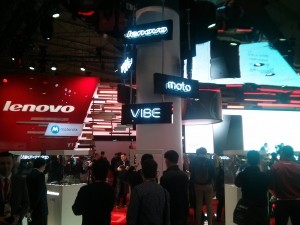 What looks like a new wrinkle has emerged in the growing love affair between Chinese PC giant Lenovo (HKEx: 992) and Japanese electronics giant NEC (Tokyo: 6701), in what could well end up as a marriage that could serve as a template for similar Sino-Japanese tie-ups in the consumer electronics space. Media are reporting that NEC has announced it will once again enter the China cellphone market 6 years after its high-profile departure, with plans to sell a smartphone model, as well as 2 tablet PCs. (English article) Historians will recall that NEC left China back in 2006, at the time citing mismanagement for its decision to leave the world’s largest cellphone market. Of course the real issue was that its phones had become virtually invisible in the market, paralleling a trend in the rest of the world that has seen not only NEC but most Japanese brand cellphones and PCs become non-players nearly everywhere except for their highly protected home market. So what’s different now that would embolden NEC to return to China, the world’s biggest mobile market but also an incredibly competitive one where consumers are especially price sensitive and NEC has little or no brand recognition? The answer is: Lenovo. Last year the 2 companies entered into an interesting agreement that effectively saw Lenovo take over NEC’s PC operations through the establishment of a joint venture. (previous post) Lenovo followed later by saying it may move some of its production to Japan, in what looked like a bid to ease concerns from NEC’s Japanese customers who were undoubtedly worried that their computers could suffer a quality downgrade if all production was moved to China. (previous post) This kind of tie-up looked interesting as it had the potential to provide Lenovo with a quick entry to the lucrative Japan market that has been one of the toughest for foreign brands to tap due in part to local preference for domestic brands that are perceived as higher quality. It also gave Lenovo, the world’s second biggest PC maker, a new premium brand to market outside Japan through its numerous sales channels in both western and developing markets. There aren’t any details in the latest reports about NEC’s decision to re-enter China’s cellphone market, but I would be willing to bet that Lenovo, as China’s dominant PC player with about a third of the market, will be a strong partner behind the scenes, providing NEC with access to its strong sales and service networks throughout the country. Furthermore, while the Lenovo name is synonymous with good quality PCs in China, the same is hardly true for its cellphones, which have had a much more difficult time establishing a strong name in the company’s home market as it vies with better known names like HTC (Taipei: 2498), Apple (Nasdaq: AAPL) and up and comers Huawei and ZTE (HKEx: 763; Shenzhen: 000063). This NEC move back into China, if Lenovo is really involved, could provide Lenovo with an important new premium brand that doesn’t have any of the baggage associated with its own cellphones. That could pave the way for an eventual joint venture for the NEC cellphone brand similar to the 2 companies’ PC tie-up. In fact, TCL (Shenzhen: 000100; HKEx: 2618), another Chinese brand known for its cheap cellphones, made a similar shift with its purchase of the Alcatel cellphone brand name around 5 years ago, and Alcatel-branded phones now account for the lion’s share of its sales outside China. So, what exactly is the end game in this growing love affair between Lenovo and NEC? If the PC partnership proves successful in Japan and this new NEC cellphone initiative in China is also a success, I could easily see an eventual sale in the next 2-3 years that would see Lenovo acquire outright NEC’s PC and cellphone units, 2 of its main consumer electronics businesses. Such a deal could serve as a template for future tie-ups between Chinese electronics companies and their Japanese counterparts. Chinese companies could use such deals to shed their image as makers of cheap, lower-end products, while Japanese firms could shed their increasingly unprofitable and marginal electronics businesses.
What looks like a new wrinkle has emerged in the growing love affair between Chinese PC giant Lenovo (HKEx: 992) and Japanese electronics giant NEC (Tokyo: 6701), in what could well end up as a marriage that could serve as a template for similar Sino-Japanese tie-ups in the consumer electronics space. Media are reporting that NEC has announced it will once again enter the China cellphone market 6 years after its high-profile departure, with plans to sell a smartphone model, as well as 2 tablet PCs. (English article) Historians will recall that NEC left China back in 2006, at the time citing mismanagement for its decision to leave the world’s largest cellphone market. Of course the real issue was that its phones had become virtually invisible in the market, paralleling a trend in the rest of the world that has seen not only NEC but most Japanese brand cellphones and PCs become non-players nearly everywhere except for their highly protected home market. So what’s different now that would embolden NEC to return to China, the world’s biggest mobile market but also an incredibly competitive one where consumers are especially price sensitive and NEC has little or no brand recognition? The answer is: Lenovo. Last year the 2 companies entered into an interesting agreement that effectively saw Lenovo take over NEC’s PC operations through the establishment of a joint venture. (previous post) Lenovo followed later by saying it may move some of its production to Japan, in what looked like a bid to ease concerns from NEC’s Japanese customers who were undoubtedly worried that their computers could suffer a quality downgrade if all production was moved to China. (previous post) This kind of tie-up looked interesting as it had the potential to provide Lenovo with a quick entry to the lucrative Japan market that has been one of the toughest for foreign brands to tap due in part to local preference for domestic brands that are perceived as higher quality. It also gave Lenovo, the world’s second biggest PC maker, a new premium brand to market outside Japan through its numerous sales channels in both western and developing markets. There aren’t any details in the latest reports about NEC’s decision to re-enter China’s cellphone market, but I would be willing to bet that Lenovo, as China’s dominant PC player with about a third of the market, will be a strong partner behind the scenes, providing NEC with access to its strong sales and service networks throughout the country. Furthermore, while the Lenovo name is synonymous with good quality PCs in China, the same is hardly true for its cellphones, which have had a much more difficult time establishing a strong name in the company’s home market as it vies with better known names like HTC (Taipei: 2498), Apple (Nasdaq: AAPL) and up and comers Huawei and ZTE (HKEx: 763; Shenzhen: 000063). This NEC move back into China, if Lenovo is really involved, could provide Lenovo with an important new premium brand that doesn’t have any of the baggage associated with its own cellphones. That could pave the way for an eventual joint venture for the NEC cellphone brand similar to the 2 companies’ PC tie-up. In fact, TCL (Shenzhen: 000100; HKEx: 2618), another Chinese brand known for its cheap cellphones, made a similar shift with its purchase of the Alcatel cellphone brand name around 5 years ago, and Alcatel-branded phones now account for the lion’s share of its sales outside China. So, what exactly is the end game in this growing love affair between Lenovo and NEC? If the PC partnership proves successful in Japan and this new NEC cellphone initiative in China is also a success, I could easily see an eventual sale in the next 2-3 years that would see Lenovo acquire outright NEC’s PC and cellphone units, 2 of its main consumer electronics businesses. Such a deal could serve as a template for future tie-ups between Chinese electronics companies and their Japanese counterparts. Chinese companies could use such deals to shed their image as makers of cheap, lower-end products, while Japanese firms could shed their increasingly unprofitable and marginal electronics businesses.
Bottom line: NEC’s re-entry to the China cellphone market looks like the latest wrinkle in its growing ties with Lenovo, which could ultimately result in a longer-term marriage.
Related postings 相关文章:
◙ Lenovo Considers Japan Production 联想向日本转移制造业务为明智公关手段
◙ Lenovo Results: Honeymoon Nearing an End? 联想并购後的蜜月期何时结束?
◙ Lenovo-NEC: Let the Defections Begin 联想与NEC结盟注定失败


 I haven’t written for a while about Lenovo (HKEx: 992), which seems to have rediscovered its appetite for questionable M&A in difficult Western markets with its just-completed joint venture that will effectively see it take over NEC’s (Tokyo: 6701) troubled PC business. (
I haven’t written for a while about Lenovo (HKEx: 992), which seems to have rediscovered its appetite for questionable M&A in difficult Western markets with its just-completed joint venture that will effectively see it take over NEC’s (Tokyo: 6701) troubled PC business. (



